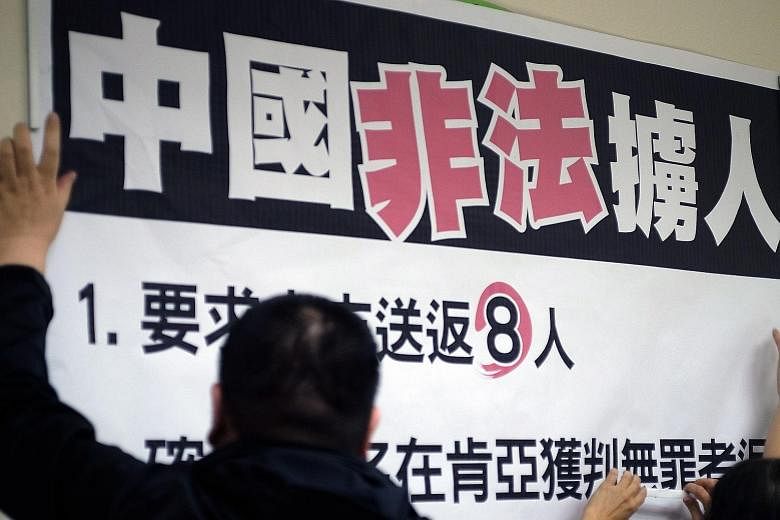Mr Lin Tsou-yen's speech is ready. He's just waiting for the invitation.
For the past six years, the World Health Organisation (WHO) has invited "Chinese Taipei" to attend its annual assembly in Geneva as an observer. This year's meeting is five weeks away but there is still no sign of the invitation. Without one, Mr Lin, the incoming Health and Welfare Minister, will not get to make his maiden speech.
The invitation may well arrive at the last minute. But the message from Beijing - never shy about exerting its influence in global organisations - is menacingly clear. From a drop in Chinese tourist numbers to what Taiwan called the "illegal abduction" of Taiwanese from Kenya, Beijing is slowly turning the screws on Taipei in hopes of influencing President-elect Tsai Ing-wen's May 20 inauguration speech.
That day, Ms Tsai - from the pro- independence Democratic Progressive Party (DPP) - is expected to expound on her China policy, which has so far been shrouded in ambiguity. She has equivocated on whether she supports the 1992 Consensus - that both sides of the Taiwan Strait agree they are part of "one China" even if they differ on what that means.
Beijing insists it is a pre-requisite for cross-strait ties to continue as they did under President Ma Ying-jeou of the China-friendly Kuomintang in the past eight years. But the DPP disputes even the existence of the 1992 Consensus .

Now, Beijing is making clear that Ms Tsai has to toe the line, or else.
It is not an unexpected turn of affairs. As Ms Tsai thanked voters for propelling her and the DPP to victory on Jan 16, some analysts were already warning cross-strait ties could suffer and Taiwan's international space would shrink.
Indeed, a pattern of China flexing its muscle has emerged.
Take the WHO apex forum, called the World Health Assembly (WHA). Taiwan sets great store by participating in the event, one of its rare appearances in the global arena. In anticipation, the announcement of Mr Lin's appointment last Thursday was made a priority so that Taiwan could inform the WHO "to send us an invitation", said Premier-to-be Lin Chuan.
China has long opposed Taiwan's participation, in whatever capacity, in international organisations, insisting that it represents the island. It was only in 2009, a year after Mr Ma took office, that Beijing dropped its opposition to its presence at WHA.
Now, it appears that Beijing may be reversing its stance, or at least threatening to do so.
That is not the only leverage at Beijing's disposal. This week, several dozen Taiwanese arrested in Kenya for telecom fraud were forced at gunpoint to board a plane for China. Beijing praised Kenyan officials for upholding the "one China" principle.
No less intimidating is the threatened withdrawal of tourist dollars, with the rumoured cut in the number of Chinese cities allowed to send tourists to Taiwan.
Last month, China re-established ties with Gambia, a former ally of Taiwan's, breaking an implicit diplomatic truce under President Ma not to poach each other's allies.
Will such tactics work?
For now, they are likely to just stiffen the spines of the Taiwanese, and strengthen Ms Tsai's hand.
But China seems to be calculating that in the long term, support for Ms Tsai will depend on her success in reviving the economy. And if suspended cross-strait relations jeopardise the economy, her position will be shaky as well.
"If she can't change the economy soon after, people will take to the streets to protest," says Beijing- based Chinese Academy of Social Sciences academic Chu Jintao.
Both sides could yet come to some acceptable compromise.
Last June, Ms Tsai pledged to push for "the peaceful and stable development of cross-strait relations in accordance with the will of the Taiwanese people and the existing Republic of China (ROC) constitutional system".
That provides some wriggle room for both sides. Even as Ms Tsai offers a nod to the ROC Constitution, which provides for one Republic of China encompassing both "Free China" and the mainland, she has recourse to popular opinion.
Beijing, meanwhile, has indicated that it could be open to some kind of statement on May 20 that cites the ROC Constitution. The Chinese Foreign Minister raised eyebrows when he said in February he hopes Ms Tsai will "accept the provision in Taiwan's own Constitution that the mainland and Taiwan belong to one, the same China". Since then, Ms Tsai has not said if the Constitution will be in her speech. On May 20, it will be clearer to what extent Beijing's gambit has worked.

